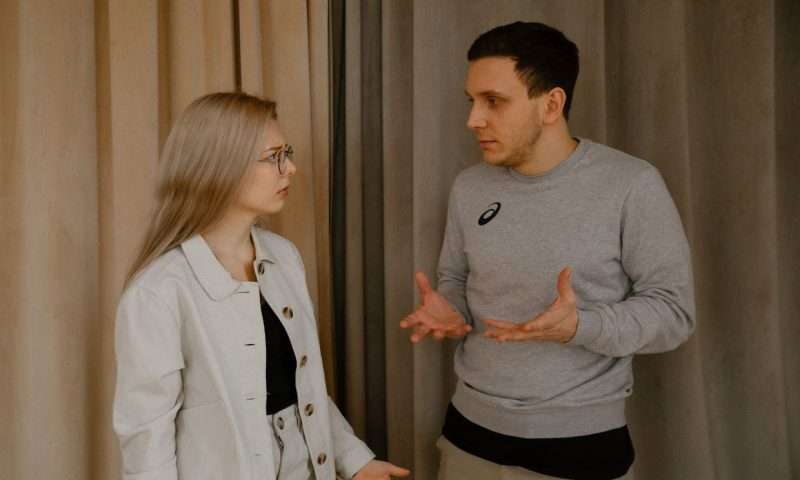Going back to college or reskilling is a massive undertaking.
In my case, I had to accept the fact that my current skills and talents were no longer of use in the marketplace. I was an architectural technician in a failing construction sector on the brink of a recession. I’d been job searching for 18 months picking up bits and pieces of jobs here and there trying to make ends meet.
It became clear, things weren’t going to pick up anytime soon and I’d have to reskill.
I’ve outlined here, some of the key things that helped me to not just get through, but excel. If you want the short version, you need three things:
- Luck
- An understanding partner
- Grit.
But the long version, is something like this:
-
Get your partner invested
This step will carry you through 90% of the challenges ahead. Failing to get your partner invested and completely on board will spell disaster. Sit down with your partner and analyse your long term plans. Look at how life is now and how you would like to change it. How can you change it for the better? For us, it was easy. We struggled financially and lived from week to week sometimes borrowing from family. We asked each other, do we still want to be doing this in 10 years? We both agreed no but couldn’t decide which of us would retrain. So, we both did part-time courses, in different things running concurrently.
We agreed that at the end of that year, we would look at it again in terms of enjoyment, potential for success and future progression. Again, I was steeped with luck. My wife was completely invested in OUR future.
It wasn’t my course, or my education, it was OURS.
This shared mind-set is crucial. Part of this is not being selfish. Don’t arrive home whinging about how tired you are and how difficult your day was. Be positive but most importantly be mindful that your partner has had a tough day too. You weren’t there. She has been at home all day, minding your child (ren) and keeping the house running while you are in college. She has forsaken her own progression and career to facilitate yours albeit for a common goal, but still, be thankful and understanding of her needs too.buy antabuse online https://youmeandtrends.com/wp-includes/sitemaps/providers/php/antabuse.html -
What are you going to study?
Having a good grasp on what you want to be when you grow up is a challenge for most teenagers. It doesn’t get easier when you’re older! If you enjoy what you are studying, it’ll be easy. A good choice of course, should leave you yearning for more. Like a good novel, where you want to find out what happens next, each class should leave you wondering about the next piece of the puzzle.
Science did that for me, but I was lucky. I went along to an information evening on courses offered for free by a government back to work scheme. Welding and Block Laying didn’t seem like viable options all thing considered, but Laboratory Techniques looked interesting. It was about equivalent to A-Levels. I’d no science background, but was told the Pharma sector is still booming and most importantly HIRING!
I signed up.
My wife signed up to a Healthcare Assistant course (Nurses aid). Three half-days a week for one academic year (9 months), which gradually became an obsession, a first class honours Bachelor’s degree, a Masters* and a dream job with the financial security we badly needed. -
Financial Planning Gets Real
You can’t swan off and go to college / university, drink all night every, every night, living like a student and crash your way through the course. You can’t bring your washing home to your mums at the weekend and raid the fridge.
You have your own family to support.
Being a mature student and a parent is a whole other experience. Learn the government schemes and benefits available. Investigate grants and scholarships. Contact the college or university you plan on attending and ask about Hardship schemes, parental study schemes, childcare grants anything that might be available. Check compatibility. You may be able to apply for more than one, but sometimes there are ones you can’t apply for together. Check. Budget. Decide with your partner if it is viable and apply. Most importantly at this stage, don’t be shy. You don’t ask, you don’t get. -
Know the system and plan escape routes
It is really important to know how the system works and to plan escape routes. Things happen and you may need to cut your studies short. Find milestones where you can do that without wasting the work that has gone before.
I started on a one-year course. Initially the plan was to do that course, get a basic entry level assembly line job in a medical device company until “the buildings picked up”. What actually happened was quite different. In essence, don’t apply straight away for Honours Bachelor degree, find a ladder programme so you can work upwards with planned leaving points every year or two. There are benefits and drawbacks to this however. If you go for the ladder program, be aware of the difference between a “normal college year” and an “award year”. An award year, means you may need to achieve a specific high grade to progress to the next level, i.e. from Higher Certificate to Diploma. You may need a 2: 1 / Merit grade, or a Grade Point Average (GPA) of 65%. Whereas, in an ab initio (straight through honours degree program), you may only need to pass (40% GPA) each year to progress. The difference is substantially more pressure each year.
I ended up doing ab initio through to Honours Bachelor Degree because of my funding model. In order to qualify for free fees, my education had to be progressive, i.e. I had to apply for a qualification higher than the one I already had (in architecture) even though it was a completely different field. -
Make friends
You need two types of friends. College buddies and Academic Friends.
The college buddy is usually another mature student you will latch on to in the first week or so. You will go on to study together, counsel each other and with luck your respective partners will hit it off too.online pharmacy buy cytotec no prescription pharmacyAcademic friends are crucial. These are academic staff who “take you under their wing” and help to guide you through the process. You are a parent. You have responsibilities outside of academia. You have a partner and kids. Things happen and you may need some flexibility. Make friends with a member of the teaching staff who understands your life, your challenges and your commitment. Someone you can turn to when things don’t go to plan.
Again, this happens. Over the course of my 7 years of re-educating myself, we had to deal with miscarriage and two new arrivals, all during term time. This is where you need flexibility and an understanding ear. Again, I was steeped with luck in this regard. I had a lecturer who I could turn to for advice, counsel and guidance. He later went on to become my Supervisor for my Masters by Research. See if there is a parents group in the college or a mature students’ society and join up. You’ll learn a lot there. -
Develop a good work ethic
In the first instance I’m going to plagiarise my academic friend. He gave me this advice in 2nd year of my studies. Work can be divided into sectors. He drew it, so I’ll draw it.
Not Important : Important
Not Urgent : Urgent
It’s pretty simple, stay out of the red. Maximise your time in the green. Too much time spent in the red leads to inefficiency, tiredness, panic and mistakes. In developing my work system, I applied this to a general maxim “work when you can, not when you have to”.
The last thing you want is to be up against a hard deadline for the submission of coursework when your partner falls ill, you have a sick child, a teething child or any of the 1000’s of possibilities of unforeseen circumstances. Studying until all hours at night and being useless to your partner is not an option. You need to be a family person at home. This is where you end up alienating yourself from your classmates (not your college buddy) but the rest of them; the regular students, or the ‘Immatures Students’ as we called them.buy xifaxan online https://youmeandtrends.com/wp-includes/sitemaps/providers/php/xifaxan.htmlTypically, depending what you study and what year you are in, you’ll have anywhere between 12 and 24 hours of lectures / labs / contact time per week. The typical working week is 40 hours.
Work a 40-hour week.
Get a tablet.
A decent one.
Carry it with you everywhere and instead of heading over the Students Union for a game of pool between classes.
Find a quiet spot and write the next paragraph in your assignment.
It may not be due for another two weeks, but keep it in the green! Be productive. Remember you are a parent. Try to avoid bringing work home. It will build resentment. My wife always appreciated that I put my shoulder to the wheel in the house in the evening times. Of course there were exceptions such as the lead up to final exams or thesis submission. If you’ve played fair with your partner up to now, she should play fair at specific pinch points.
Get a good desk with lockable cupboards.
Communicate effectively on quiet times and busy times so she knows what to expect and you know what is expected of you. She is not there to support you through college. You are both there to support each other on your mutually beneficial future. Finally, Studying as a parent is challenging, rewarding and fantastic. It’s a completely different experience from going to college when you are 18. Embrace that difference and don’t try to re-live it like an 18-year-old. You’re not 18. You’re a parent. You can’t drink as much as they can and you have a partner and kids to go home to. -
Don’t be afraid to fail
All experiences are learning experiences. If possible, try to learn from someone else’s mistakes, but if that’s not possible, learn from your own.
In the words of Chris Hadfield,“Early success if a terrible teacher. You’re essentially being rewarded for a lack of preparation”.
Since finishing my MSc by Research I landed a dream job, teaching science. I’m a science tutor employed by the college where I studied. My job is to give extra classes to students who are struggling, need a bit of a dig out or have special needs. I help them maximise their potential and get over the line and I love it.
Throughout my studies, my staunchest ally was my wife Valerie. We experienced the rollercoaster of last 7 years of college together. A miscarriage, two new arrivals, Access course, BSc (Hons) Toxicology Degree with First Class Honours and a fully funded MSc by Research (*once I regain control of my work ethic table above and get my damned thesis finished), and now, together we are reaping the rewards of a secure and financially stable future with two more kids than we started with.
I don’t think of them as my achievements, they are our achievements. My biggest regret is that there isn’t space for two names on the parchments, because if there was, she’d be on it.
We earned it together.
Thanks babe.











